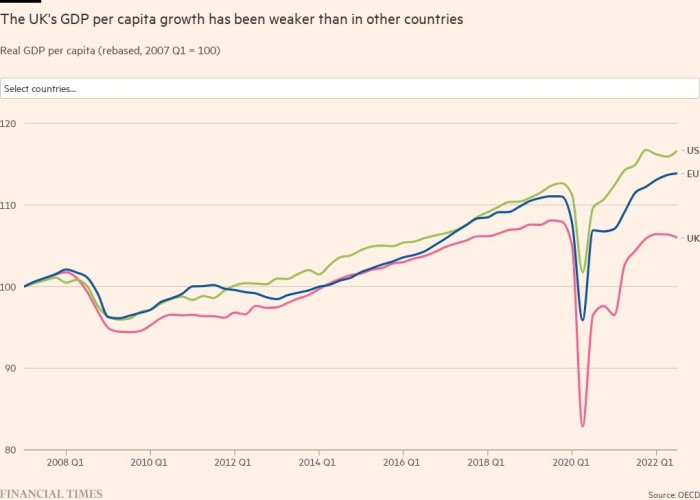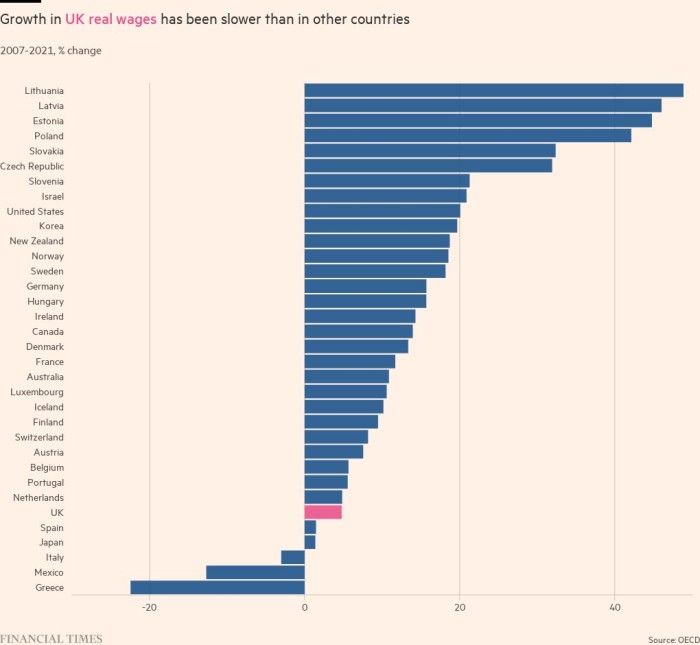UK living standards have lagged behind other industrialised countries since the financial crisis, highlighting the scale of the challenge for chancellor Jeremy Hunt after he used his Budget to pledge measures to make Britain one of the “most prosperous” nations in the world.
The Office for Budget Responsibility is predicting UK households’ real income per person will still be below pre-pandemic levels in 2027-28, suggesting Britons risk experiencing hardly any improvement in their living standards for 20 years.
Jumana Saleheen, chief economist at Vanguard Europe, said that on three key measures of living standards, household income, gross domestic product per capita and real wages, “we’ve seen stagnation over the last 15 years”.
“It’s growth, growth, growth until the global financial crisis and then flat,” she added.
Average UK real household income is broadly unchanged since 2007, just before the banking crisis, according to data from the Office for National Statistics.

Household income per capita across OECD countries increased by 20 per cent between the first quarter of 2007 and the third quarter of 2022, but it only rose by 6 per cent in the UK, figures from the Paris-based international organisation show.
“We are in the middle of a decade in which incomes are barely rising at all, with very feeble growth for two full decades,” said Paul Johnson, director of the Institute for Fiscal Studies, a think-tank.
Meanwhile the UK has recorded the second-lowest GDP per capita growth among G7 countries after Italy since the financial crisis, OECD data show. British output per capita growth was half that of the US and the EU.
And UK wages adjusted for inflation, having increased by 23 per cent in the eight years to 2008, fell by 5 per cent in the following eight years, according to the ONS.
By 2021, UK real wages were up just 4 per cent from 2007, placing the country 28th out of 34 countries in an OECD ranking by earnings growth. That compares with an 20 per cent increase in real wages in the US and a 16 per cent rise in Germany.

Less well-off households in the UK have suffered the most during the squeeze on living standards following the banking crisis, and recorded a decline in life expectancy, according to economists.
Low income households in the UK are now 22 per cent poorer than their counterparts in France, research by the Resolution Foundation, another think-tank, found.
For people living in England’s most deprived areas, average life expectancy fell by eight months for women and five months for men between the periods 2011 to 2013 and 2018 to 2020, according to ONS statistics.
Life expectancy “has slowed down, especially for people in lower income groups”, said Jonathan Portes, professor of economics and public policy at King’s College London.

The UK’s lack of productivity growth since the financial crisis is to blame for the stagnation in living standards, according to analysts.
“The single factor that explains the poor performance of the UK GDP per capita, real wages and real household disposable income is low productivity growth compared to the rest of the G7,” said Ashley Webb, economist at Capital Economics, a consultancy.
Economists said there were several reasons for the UK’s weak productivity growth — or slowdown in the pace of output per hour worked — including the decline of the financial services industry since the banking crisis and stagnant business investment since the Brexit referendum.
Emily Fry, economist at the Resolution Foundation, said “even if business investment does start growing again, we will have still lost seven years or so of capital spending because of the uncertainty”.
Fry said that slow productivity growth since the financial crisis “is really what has been driving some of our weakening living standards over the last 15 years”.
Saleheen said the UK was at the frontier of productivity growth until the mid-2000s, when the country was catching up with the performance of the US, France and Germany, but slowed to near stagnation after the financial crisis. Over that time, the UK moved from “hero to zero,” she added.

Several economists said the measures unveiled by Hunt in his Budget on Wednesday would not be enough to significantly boost UK living standards.
One key initiative by the chancellor was a scheme to boost business investment under which companies can write off 100 per cent of their capital spending against taxable profits.
The capital allowances scheme is due to last three years, and cost about £9bn per annum, although Hunt said he would like to make the arrangements permanent “as soon as we can responsibly do so”.
Johnson said the “government needs to learn that stability and consistent long-term strategy are vital for companies looking to invest and therefore for securing better living standards”.
Ryan Shorthouse, chief executive at Bright Blue, another think-tank, said the Budget suggested “economic growth and living standards remain damped for the foreseeable future”.
Stay connected with us on social media platform for instant update click here to join our Twitter, & Facebook
We are now on Telegram. Click here to join our channel (@TechiUpdate) and stay updated with the latest Technology headlines.
For all the latest Business News Click Here
For the latest news and updates, follow us on Google News.
